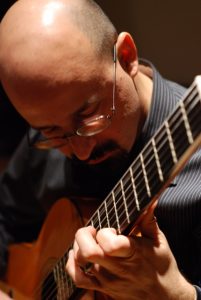This week our friend John Alvarado, Lecturer of Guitar at IUPUI and President of the Indianapolis Society of the Classical Guitar, discusses the presumed dichotomy of classical guitar vs electric guitar in the musical community. Read below to learn how these two genres don’t need to be separated as much as some may think.
Classical vs. Electric Guitar
I have been playing guitar for most of my life and for much of that time I have specified that I am a “classical” guitarist. I still do, largely out of habit. But the truth is I am not sure I know what that means anymore.

John Alvarado
I rarely hear other instrumentalists do this. “Hi, I’m Matt, I play classical clarinet.” So what do we mean by “classical guitar?” Are we talking about the instrument, the modern nylon stringed acoustic guitar? Or are we talking about the repertoire? Or perhaps we are talking about a particular approach to playing? All of these possibilities lead to more questions though. If I play Tárrega on a steel string guitar is it no longer classical guitar? Why, if I play an arrangement of Desafinado on a nylon string guitar in a recital is it considered a classical guitar arrangement, but if played on an archtop with a combo it is considered a jazz piece? Classical guitarists play arrangements of Piazzolla’s music on our nylon string guitars, but in Piazolla’s own combos he wrote for electric guitar. If I play Bach or Domeniconi on an electric guitar is it no longer classical music?
Certainly one could argue that it is a matter of the right tool for the right job. But the fact is when we play Bach on the modern classical guitar we are often playing arrangements of violin or cello pieces. So we are already arranging for a different instrument. When we play the Renaissance works of Milan, or the Baroque pieces of Sanz, or even the works of Fernando Sor and Mauro Giuliani we are playing on a different instrument than they were. So, why not view the electric guitar as yet another voice with which to expand the sound of the classical guitar world?
What about looking at the electric guitar as another modern voice for a composer that is capable of the nuance and complexity of traditional classical guitar arrangements, but still adding something new and unique to the repertoire? I’ve heard it argued that classical guitar doesn’t fit well on the electric because of the design differences, but I listen to this performance of Bach on electric guitar and I think it holds up against many of the graduate guitar recital performances that I have heard on traditional classical guitars.
Or, for something more modern, what about Elliott Carter’s piece Shard. Originally written for traditional classical guitar and premiered by David Starobin in 1997, this atonal work is extremely complex even on the instrument it was written for. But here is Derek Johnson performing it to great effect on electric guitar.
Other modern composers, such as Glenn Branca and Steven Mackey have explored the electric guitar as its own new voice exploring the sonic opportunities it provides. Steven Reich wrote the piece Electric Counterpoint in 1987 and it remains one of the best-known works composed specifically for electric guitar. Interestingly, it was originally recorded by Pat Metheny, a jazz guitarist.
https://www.youtube.com/watch?v=plL2VDAoThU)
Which leads to another question: Why, in most music programs is it assumed that if a student plays electric guitar he or she must be a jazz guitarist and nylon string guitarists are automatically pushed in the classical direction? I would argue that in the modern world of music making this is far too narrow of a way of seeing things.
At IUPUI we have actually done away with the designations of jazz guitar and classical guitar entirely. Students simply audition and are accepted as guitarists, which has freed us up from many of these pre-conceived notions and limitations. Our guitarists may be studying a piece by Fernando Sor one day and the next performing new works on electric guitar in an Electro-Acoustic ensemble. In the spring semester the Indianapolis Society of the Classical Guitar and IUPUI’s Department of Music and Arts Technology will be hosting the French guitarist Pierre Bibault in concert. His performance will range from traditional classical guitar works on nylon stringed guitar, to pieces with classical guitar and electronic effects, as well as works composed specifically for electric guitar. (More details at www.indianaguitar.org)
I would encourage the classical guitar community to further explore the electric guitar as a concert instrument. Keyboard players often move seamlessly between grand pianos and electric keyboards. Jazz guitarists like Pat Metheny and Fared Haque move freely between nylon and steel string with regularity. Why should we classical guitarists not to do the same?
To learn more about John Alvarado, visit his website here. And to find upcoming concerts and learn more about the Indianapolis Society of the Classical Guitar, visit their website here.






Leave a Reply